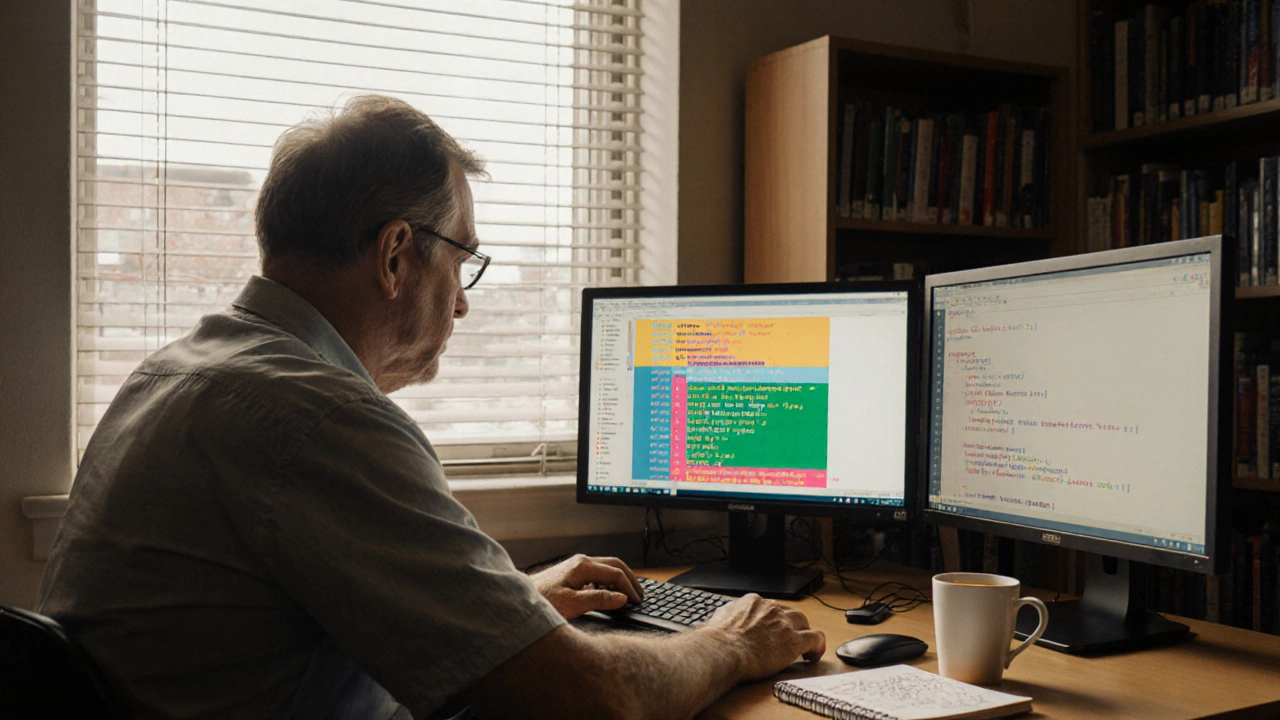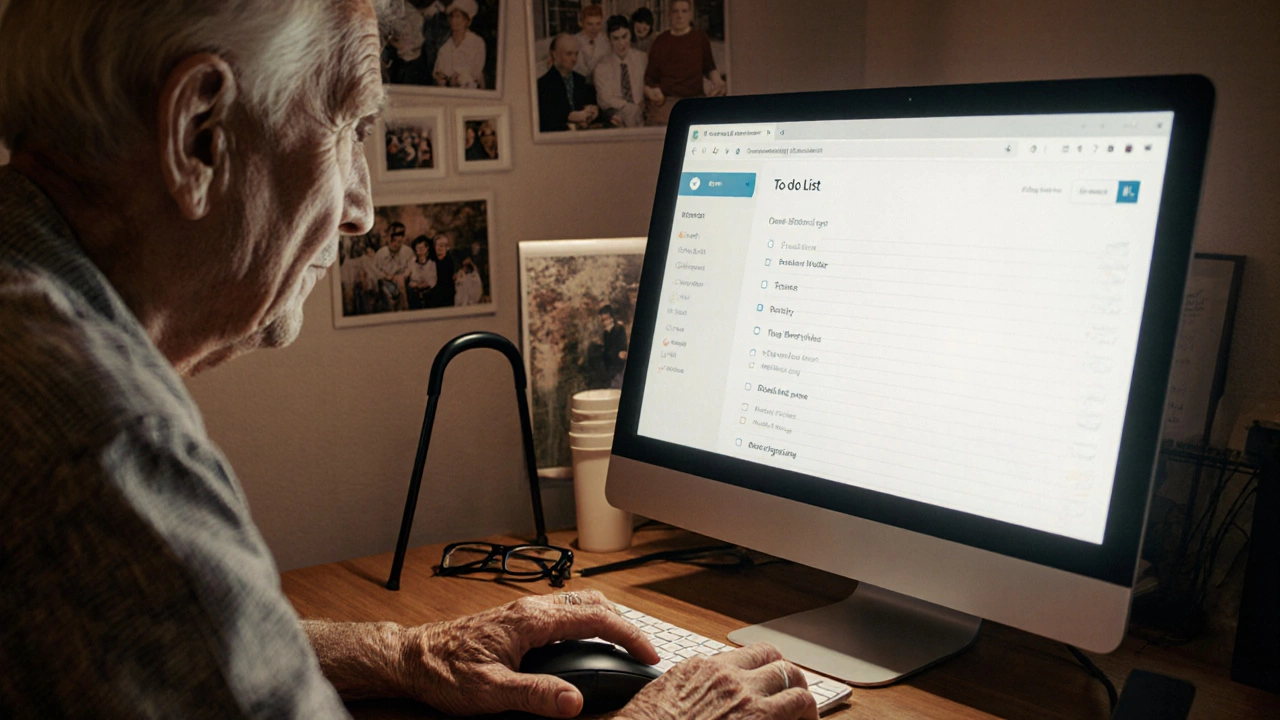You’re 50. Your kids are grown. Your career has settled into a rhythm. And now, out of nowhere, you’re thinking: can I still learn to code? Maybe you saw a friend build a website. Or your grandkid showed you a game they made. Or maybe you just feel like there’s more to life than watching the clock tick down to retirement. The truth? You’re not too old. Not even close.
Age doesn’t slow down learning - fear does
People over 50 learn coding faster than you think. Not because they’re geniuses, but because they’ve learned how to learn. They’ve survived layoffs, raised kids, fixed leaky roofs, and managed budgets. They know how to focus. They know how to ask for help. They don’t waste time pretending they already know everything.
Here’s what actually slows people down: the myth that coding is for the young. That you need a computer science degree. That you have to be good at math. That you’ll be surrounded by 20-year-olds who talk in jargon. None of that is true.
At 52, Margaret from Adelaide started learning Python after her husband retired. She didn’t want to sit around. She built a simple app to track her garden’s watering schedule - and now she’s teaching a weekly class at the local community center. At 56, Robert from Perth switched from accounting to front-end development. He took free online courses, built three portfolio sites, and landed a remote job at a small startup. He didn’t need a degree. He just needed to start.
What you actually need to get started
You don’t need to buy a new laptop. You don’t need to quit your job. You don’t even need to spend money.
Here’s what you do need:
- A computer that turns on (even a 5-year-old one works)
- Internet access (public libraries offer free Wi-Fi)
- One hour a day, five days a week
- Patience - not for yourself, but for the process
The best place to begin? Free platforms like freeCodeCamp, Codecademy’s free tier, or Khan Academy’s JavaScript course. These don’t require prior experience. They don’t assume you know what a ‘variable’ is. They start from zero.
Start with HTML and CSS. They’re visual. You change a line of code, and the webpage changes right in front of you. That instant feedback? It’s addictive. It tells you: you’re doing this.
Why older learners succeed
Younger students often jump from one tutorial to the next, chasing the next shiny thing. They get frustrated when something doesn’t work. They quit because they think they’re ‘not cut out for it’.
People over 50? They stick. Why? Because they’ve been through harder things.
They’ve learned that progress isn’t linear. They’ve learned to try again. They’ve learned that asking ‘Why doesn’t this work?’ is smarter than pretending it should.
Studies from MIT and Stanford show that adults over 50 who learn coding retain information better than younger learners - not because they’re smarter, but because they’re more deliberate. They take notes. They revisit lessons. They don’t rush.
One 2023 survey of 1,200 adult learners over 50 found that 78% completed at least one full coding course. Only 12% said they felt ‘too old’ - and those were the ones who never started.

What you can build - and why it matters
You don’t need to become a software engineer at 55. But you can build things that change your life.
- A website to showcase your photography, woodworking, or recipes
- A simple app to manage your medications or doctor appointments
- A blog that shares your life stories - coded by you
- A tool to track your walking steps or sleep patterns
One man in his 60s built a tool that auto-schedules his weekly bus routes. He used JavaScript and Google Sheets. He didn’t sell it. He didn’t get a job. He just made his life easier. That’s the real win.
And here’s the quiet truth: learning to code after 50 isn’t about money. It’s about proving to yourself that you’re still capable of growth. That you can still be a beginner. That you can still be curious.
Common fears - and how to crush them
Let’s talk about the fears that hold people back.
‘I’m not good with technology’
You don’t need to be. You just need to be willing to click around. Every coder, no matter their age, spends 80% of their time Googling errors. You’re not behind - you’re normal.
‘Everyone else is younger’
Most online coding classes have people over 40. In fact, 35% of learners on Udemy and Coursera are over 45. You won’t be the oldest. You’ll be one of many.
‘I’ll never get a job’
You don’t need a job to learn. But if you want one? Companies are hiring. Not for ‘youthful energy’ - for problem-solving skills. A 2024 report from LinkedIn showed that 40% of hiring managers value experience over age. One tech startup in Melbourne hired a 58-year-old former teacher because he could explain complex ideas simply. That’s rare. That’s valuable.
‘It’ll take too long’
It takes 6 months to go from zero to job-ready - if you practice 15 hours a week. That’s 2 hours a day, 5 days a week. You can do that. You’ve done harder things.

Where to go next
Here’s a simple roadmap:
- Start with HTML and CSS on freeCodeCamp (1-2 weeks)
- Learn JavaScript basics (3-4 weeks)
- Build one small project - like a to-do list or a weather checker
- Join a local coding meetup or online community (like Reddit’s r/learnprogramming)
- After 3 months, pick a direction: web dev, data, automation, or just keep building for fun
There’s no deadline. No exam. No one’s watching. You’re learning because you want to. That’s the most powerful reason of all.
What happens when you finish your first project
It’s not about the code. It’s about the feeling.
You sit back. You look at the screen. You made that. No one gave it to you. No one handed you a diploma. You sat down, you tried, you failed, you tried again - and now it works.
That’s confidence. That’s power. That’s what no age can take away.
Is 50 too old to start learning coding?
No. People in their 50s, 60s, and even 70s are learning to code every day. Success doesn’t depend on age - it depends on consistency. Many start with free online courses and build real projects within months. What matters is showing up, not how young you are.
Do I need a computer science degree to learn coding after 50?
Absolutely not. Most people who learn coding later in life don’t have degrees. Employers and clients care about what you can build - not what’s on your resume. Free platforms like freeCodeCamp, Codecademy, and Khan Academy teach everything you need to know without a single textbook.
Can I find a job as a coder after 50?
Yes - but not always as a junior developer. Many people over 50 find roles in tech support, freelance web development, or internal tools building for small businesses. Your life experience makes you better at explaining problems, understanding user needs, and staying calm under pressure - skills companies value more than ever.
What’s the easiest programming language to learn after 50?
HTML and CSS are the easiest to start with because you see immediate results - changing colors, layouts, or text on a webpage. After that, JavaScript is the most practical next step. It’s used everywhere, from websites to apps, and there are tons of beginner-friendly tutorials. Python is also great if you’re interested in automation or data.
How much time do I need to spend each week?
As little as 5 hours a week can get you started. To build real skills, aim for 10-15 hours. That’s just 2 hours a day, 5 days a week. You don’t need to spend all day coding. Consistency beats intensity. Even 30 minutes a day adds up over time.
Will I feel out of place in coding classes?
Not if you choose the right environment. Online platforms like freeCodeCamp and Codecademy have learners of all ages. Local community centers and libraries often host beginner-friendly coding circles for adults. You’ll find others who are just starting - and many who are proud of how far they’ve come.
What if I get stuck and don’t understand something?
Everyone gets stuck. Even professional coders spend hours debugging. The key is to break the problem down: What exactly isn’t working? What did you expect to happen? Search the error message online - 90% of the time, someone else has solved it. Don’t be afraid to ask. Coding communities are surprisingly welcoming to beginners, especially those who are respectful and persistent.
Can coding help me stay mentally sharp as I age?
Yes. Learning to code is like mental weightlifting. It improves memory, problem-solving, and focus. A 2022 study in the Journal of Cognitive Enhancement found that adults over 50 who learned programming showed measurable gains in executive function and mental flexibility. It’s not just a skill - it’s a form of brain health.
What if I don’t want a job - just want to build things for myself?
That’s more than enough reason. Many people over 50 learn coding to automate chores, create digital photo albums, manage health data, or share stories with family. You don’t need permission to learn for joy. In fact, that’s often the most sustainable path. Coding becomes a hobby - and hobbies keep life meaningful.
Where can I find free coding resources for beginners over 50?
Start with freeCodeCamp (freeCodeCamp.org), which offers full courses with projects you can add to a portfolio. Codecademy has a free beginner track. Khan Academy’s JavaScript course is clear and visual. YouTube channels like The Net Ninja and Traversy Media have beginner-friendly tutorials. Your local library may also offer free tech workshops - ask.
Final thought: You’re not behind. You’re just beginning.
There’s no expiration date on curiosity. Coding isn’t a race. It’s a conversation - between you and a machine. And the machine doesn’t care how old you are. It only cares if you show up and try.
So go ahead. Open your browser. Type in freeCodeCamp. Click ‘Start Learning’. That’s all it takes. The rest? It’ll follow.
